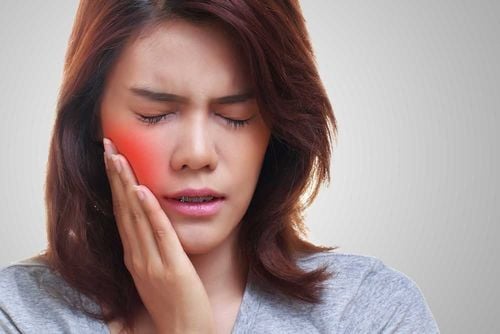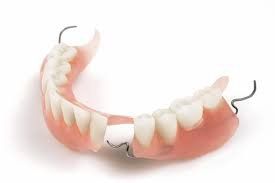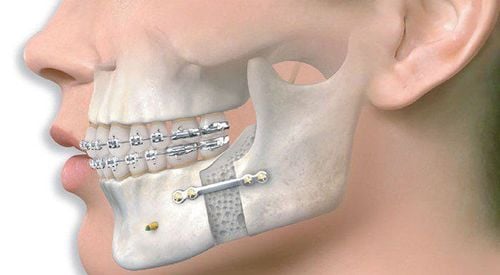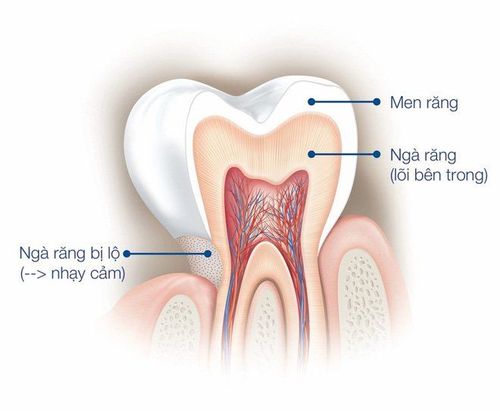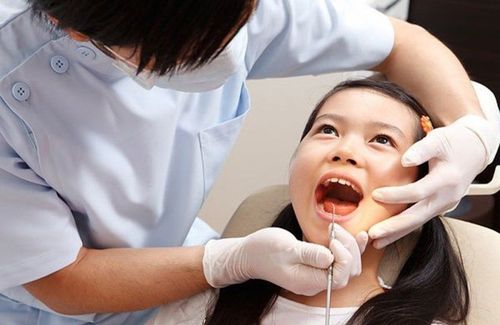This is an automatically translated article.
The article was consulted with Specialist Doctor I Nguyen Trung Hau - Doctor of Odonto-Stomatology - Department of Medical Examination & Internal Medicine - Vinmec Da Nang International General Hospital.Your dentures “work” hard all day and deserve a rest at night. Removing and cleaning them every night will help keep your dentures clean, free of bacteria. So how to clean dentures without bad smell? Here are instructions to help care and clean dentures properly.
1. What are removable dentures?
Removable dentures are teeth made from materials such as acrylic, nylon or metal that fit snugly against the gums and remaining teeth so that the patient has a complete set of teeth. Dentures also help patients who have lost most of their teeth to chew food and talk normally. However, they may not bite as effectively as natural teeth.There are two types of removable dentures, they are:
Complete denture: A complete set of dentures for the upper, lower jaw or both. Partial dentures: Removable teeth for only one or a few teeth.
2. Why make dentures?
Dentures become necessary if the patient has lost all or most of their natural teeth, even if the teeth are still there but in such poor condition that they decide that dentures would be a better option. They offer the following advantages:Reduce eating problems. Prevents speaking problems. Improve smile aesthetics. Can enhance patient confidence.

Răng giả giúp cải thiện vẻ thẩm mỹ và chức năng ăn nhai, do đó cần vệ sinh răng giả.
3. Instructions for taking care of dentures without bad smell
Partial or full dentures can be removed for care to keep them clean, free from yellowing and more aesthetically pleasing. To take good care of dentures, the following steps should be taken:Remove and clean dentures after eating: Rinse under water to remove food debris and other loose particles clinging to dentures. Also, learn how to insert dentures after each removal. Handle dentures with care: Make sure you don't bend, damage the plastic or the clasp when cleaning. Cleaning the mouth after removing dentures: Use a soft-bristled brush to clean the tongue, cheeks, and roof of the mouth. If used, any denture adhesive remaining on your gums should be removed. Daily denture brushing: Gently remove and clean dentures daily. Soak and brush them with a soft-bristled brush, a detergent suitable for removing food, plaque. If you use denture adhesive, clean the grooves that match the gums to remove any remaining adhesive. Do not use denture cleaners inside your mouth. Soak dentures overnight: Most dentures need to be kept moist to fix their shape. Soak the denture in water or a suitable solution overnight. Follow the manufacturer's instructions for cleaning and soaking. Rinse dentures thoroughly before putting them back in your mouth, especially if using a denture soak. These solutions may contain toxic chemicals that cause vomiting, pain, or burns if swallowed. Schedule regular dental exams: For people who wear full dentures, regular dental checkups are recommended. For those who wear partial dentures, annual visits and dental X-rays are recommended to preserve the remaining natural teeth. Go to the dentist if your dentures are loose: In the case of loose dentures, you should go to a medical facility for an examination. Because loose dentures can cause irritation, sores and infections.
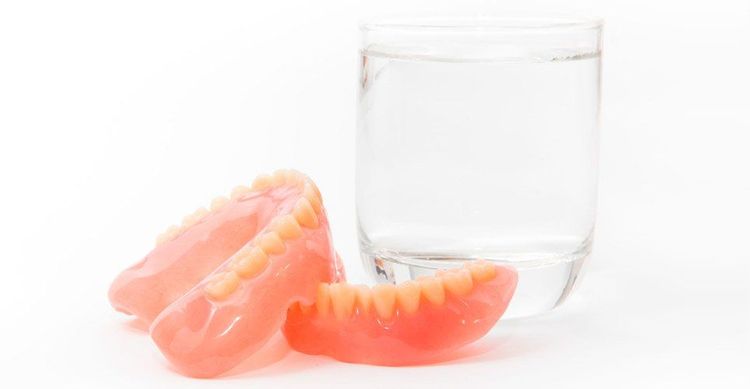
Vệ sinh răng giả sẽ giúp loại bỏ vi khuẩn và mùi hôi.
4. What should be avoided when wearing dentures?
Abrasive cleaning materials: Avoid brushes with stiff bristles, harsh detergents, and toothpaste, as they are too abrasive and can damage your dentures. Whitening toothpaste. Products with teeth whitening agents: Do not use any whitening products as they can weaken dentures and change their color. Do not immerse metal dentures in a solution containing chlorine, as it can stain and corrode the metal. Hot water: Avoid hot or boiling water, as it can warp your dentures. In short, partial or complete dentures can be stained, damaged and cause a lot of trouble for users if not cleaned properly. Therefore, you should regularly take care of your dentures to keep them clean, not yellow and look more aesthetically pleasing.If there is a problem with the consultation, you can go to Vinmec hospital for a doctor to examine, take a film to check the entire oral condition to treat cavities, periodontal disease before making dentures, instructions edit during and after implementation.
Please dial HOTLINE for more information or register for an appointment HERE. Download MyVinmec app to make appointments faster and to manage your bookings easily.




